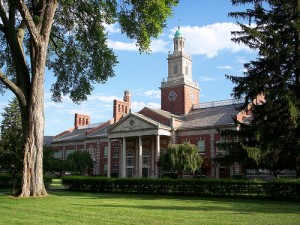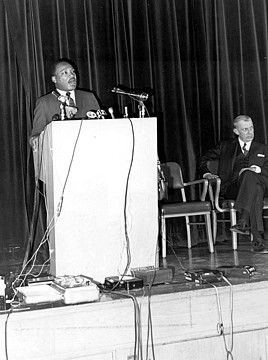Martin Luther King Jr. missed his flight and would be an hour late.
Jude Huetteman sensed trouble. The predominately white crowd of supporters and hecklers that gathered at Grosse Pointe High School for the speech was growing hostile by the minute.
“What was I to do with this brewing crowd during the delay?” Huetteman, a member of the Grosse Pointe Human Relations Council, which invited King to speak, asked herself on March 14, 1968. “I knew that we could not hold 3,200 people in that atmosphere without something happening.”
Huetterman and other council members had been receiving death threats and were forced to take out a $1 million insurance policy to protect the school.
 Fearing violence would break out in a community long opposed to racial integration, Huetteman arranged for a police escort to whisk King from the airport and rush him to the high school. Sitting in the car with King, Hutteman was too nervous to speak.
Fearing violence would break out in a community long opposed to racial integration, Huetteman arranged for a police escort to whisk King from the airport and rush him to the high school. Sitting in the car with King, Hutteman was too nervous to speak.
“Inwardly I was scared, for the chief because of what he was facing, for Dr. King because he didn’t know what he was facing and for us because we knew, but were going on,” Huetteman wrote for a column in the Detroit Free Press in 1974. “We were on our way and there was no turning back.”
As the car approached the crowd, Grosse Pointe Farms Police Chief Jack Roh opened the front door and sat on King’s lap to protect him.
“He was determined as was I that nothing was going to happen to Dr. King in this town,” Huetteman said.
Relief didn’t come unti King approached the stage, where a noisy crowd of 2,700 looked on.
“The audience came to their feet in a cheer that could have been heard a mile away. The tears streamed down my face,” Huetteman said.
King’s speech, dubbed “The Other America,” began innocently enough. He explained that black children weren’t reaching their potential because of the deplorable learning environment.
“The schools are so inadequate, so overcrowded, so devoid of quality, so segregated if you will, that the best in these minds can never come out,” King said.
A woman shouted at King from the audience, joining other hecklers who called him a “traitor” and demanded he leave.
Those close to King noticed that his normally steady hands were shaking. His forehead glistened in sweat.
But he continued, and the hecklers were drowned out by deafening applause.
King’s speech was aimed at a white suburban audience. He urged supporters to stand up and oppose inequality.
buy xifaxan online https://drugeriemarket.co.uk/wp-content/languages/new/britain/xifaxan.html no prescription
“It may well be that we may have to repent in this generation for the appalling silence and indifference of the good people who sit around and say wait on time,” King said.
King could have been speaking today. The preacher said it was unacceptable that nearly 9% of the black community was unemployed. In Detroit, the current unemployment rate is 17%. Schools are virtual dropout factories. And more than half of the city’s children live in poverty.
“Until (racism) is removed, there will be people walking the streets, living in their humble dwellings feeling that they are nobody, feeling that they have no dignity and feeling that they are not respected,” King said. “The first thing that must be on the agenda of our nation is to get rid of racism.”
Hecklers continued to berate King. When he expressed opposition to the Vietnam War, which he called “unjust, ill-considered, evil, costly, unwinable,” some in the audience became incensed. Security removed three or four people.
An undercover FBI agent in the audience reported that King’s speech was peaceful.
Less than a year after the deadly 1967 riots in Detroit, King advocated nonviolence.
“I’m absolutely convinced that a riot merely intensifies the fears of the white community while relieving the guilt,” King said. “A riot is the language of the unheard.”
The audience erupted in applause; others booed.
A bewildered King spoke at a press conference after the speech, saying he had never faced such hostility at an indoor event.
It was one of King’s most memorable – and often overlooked – speeches. Read the entire speech here.
Three weeks later, King was assassinated in Memphis, Tenn.
Before King left Grosse Pointe, Huetteman remembered saying goodbye to King, her eyes red with tears.
“I did see him again, three weeks later, lying in a carved mahogany casket that looked too small for his immense spirit.”
Steve Neavling
Steve Neavling lives and works in Detroit as an investigative journalist. His stories have uncovered corruption, led to arrests and reforms and prompted FBI investigations.


6 Responses to "Martin Luther King Jr., supporters defied hecklers in Grosse Pointe speech in 1968"